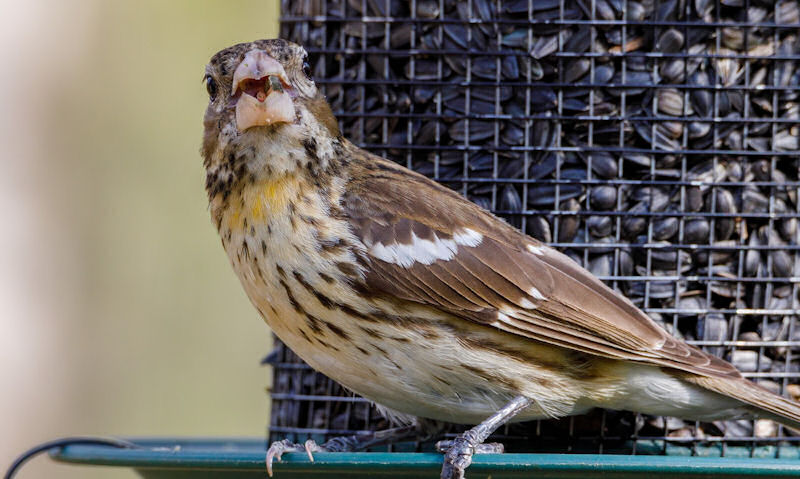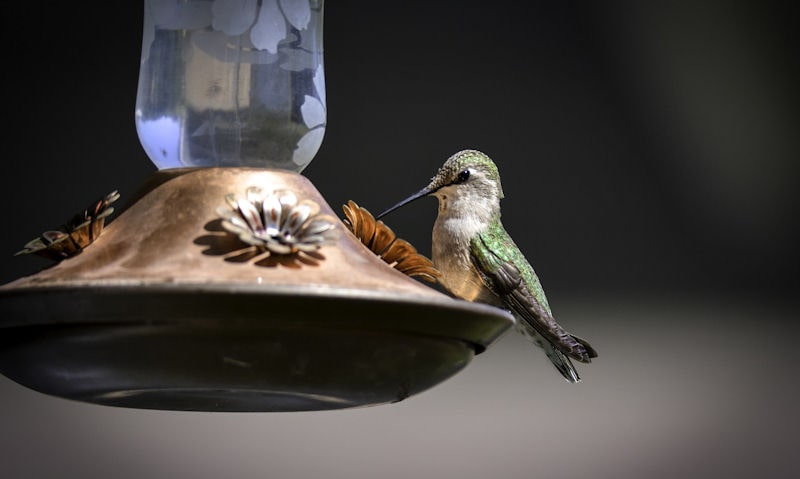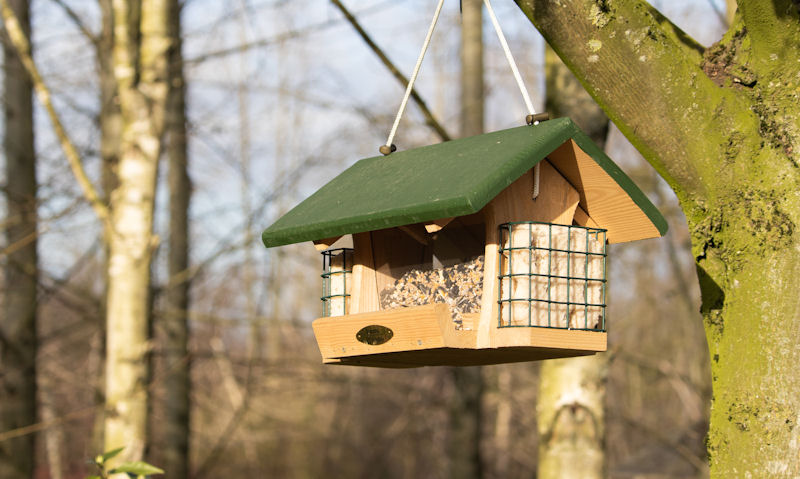Disadvantages of bird feeders
With the downsides of bird feeders being few and far between, I still believe bird feeders outweigh the negatives, as you find your feet if giving feeders time to settle.
Disadvantages of bird feeders is related to the bird food devices becoming unsanitary if unkempt, and when they're cleaned - cleaning bird feeders can be a bit yucky and sometimes smelly. Unused feeders can be a waste of time and money, whilst attracted unwanted pests rather than beautiful songbirds.
Certainly our common backyard birds can go without a bird feeder of any kind, its just those times of the year where food in the wild can become scarce.
If you feel bird feeders aren't for you as they involve too much time and effort, of which you can't afford - you can still feed birds without bird feeders which requires little to no cleaning on your part, or extra expense.
I still believe bird feeders will continue to play a vital role as its possibly the only way you can invite wildlife into the yard.
Cleanliness is the biggest issue to overcome, and if you do then the rest is easy.
Expense isn't an issue nor is re-stocking bird food as it can last a while, but then there's the disadvantage of changing out bird food; which can be such a bother you'd probably postpone it until feeders go beyond needing a simple clean.
What is the worst thing about feeders is the muck that builds up, so only those committed to the cause can stay ahead of the mess.
In regard to environmental issues, bird feeders aren't considered good for the earth as they can't be recycled - and can often be quickly disposed of in place of brand new feeders, made in plastic.
Bird feeders can be unsanitary
Major disadvantages of bird feeders on your part is of course they can be unsanitary.
Birds are well known carries of germs which a bird feeder can contribute to. Which means a feeder would always need your intervention to prevent birds feeding on potentially harmful bird food.
Salmonella is a big concern involving wild birds which will be passed on to one bird to the next as bird pick up the bacteria on the bird feeder or if its ingested when contaminating bird food.
Feeders can be kept sanitary for sure but for most of us we don't tend to look after our bird feeder equipment as much as we should.
Disadvantage as it is, an unsanitary bird feeder of any kind must be cleaned out to kill off bacteria - as people would normally allow a feeder to go beyond its best to then have no other choice than to throw it out.
Cleaning can be yucky
Of course what is a convenience to most of us is the need to clean bird feeders to kill off bacteria, whilst wiping away stains or scraping off residue.
Bird food really likes to congeal inside a bird feeder which can be near impossible to clean up if left too long. And with bird food turning into a hard to remove residue, our job of maintaining a bird feeder feels like it isn't worth it.
To not maintain a feeder one to three times a month, bird food will become near impossible to clean up properly inside the feeder - with it never feeling clean as it used to be when brand new.
As you'd need to get your hands dirty so to speak - as you'd wear gloves to clean feeders - this is where the yucky factor comes in when coming into direct contact with potentially salmonella riddled feeders.
You clean bird feeders with a concoction of dish soap with the disadvantage of going through the trouble of making up an homemade disinfectant cleaner out of white vinegar or bleach, to clean up super dirty bird feeders.
In due course, bird feeders will appear a bit on the messy side due to wear and tear, whereas the interior can become so bad it would become a health hazard.
Major disadvantage then is cleaning bird feeders made for seeds, suet or peanuts, whereby hummingbird or oriole nectar-filled feeders feel a little more comfortable to work with.
No quick fixes either as you can't put bird feeders in the dishwasher so you must go carefully when scrubbing bird feeders by hand.
Attract unwanted attention
Where there's food there's sure to be a number of wildlife lining up ready to pounce on the abundance of bird food available.
Unfortunately, it can be all but wild birds who come to bird feeders, with a major setback if you continue to be swamped by squirrels, raccoon's and other woodland creatures continuing to raid the bird feeders.
Common pests will be unwanted large birds raiding bird feeders including crows and pigeons or more boisterous, noisy starlings.
Some will have no issues at all with this but if you paid any attention you would come to realize the presence of larger birds, squirrels or other pests will keep songbirds well away.
Unfortunately you'd then you have to shell out on mostly anti-squirrel deterrents at extra cost along with refining your squirrel baffle or squirrel proof feeder until the time comes pests cannot steal the bird food any longer.
Along with unwanted wildlife, there's also the possibility of cats coming to bird feeders or your family dog refusing to stay clear of the bird feeder pole.
Potential waste of time
Disadvantage of fully immersing yourself in a brand new bird feeding station which would be placed in the center of the lawn or feeders are hung up in trees - could be birds won't come to your feeders at all.
Actually few birds could still come but not enough to warrant so much of your time and effort.
Its common for people to go over the top when setting up all kinds of bird feeders along with a mix of bird food to be sure all birds can feed.
What you'd only find out later after days or weeks of waiting, is that birds are simply not using your bird feeders.
Factors such as food is plentiful in the wild or birds could be going to a neighbors bird food source - leaving you with the disappointment of the time you put in to it - only for bird feeders to rarely be used.
Bird feeders are a good thing I can assure you because in time the feeders would possibly see an uptake in use, when the season or weather changes.
Disadvantage of that is people can give up too soon thus bird food plus bird feeders would be packed away before anything good can come out of it.
Expense with no return
Waste of time and effort committing to setting up a welcoming bird feeding station for sure, but then of course there's the expense.
Expense isn't too costly but it can be when you go over the top when not knowing feeders simply don't get used as much as you thought; let me tell you it could be unusual for your bird feeders to be unused as birds love coming to feeders all year round.
Despite that, the cost can be high initially with bird feeders filled to the top with a mix of bird food, plus additional bird food used to top up feeders.
Bird feeders aren't expensive as you may know but additional cost in bird food can slowly rise if feeders do indeed become popular.
Spending so much time and effort on new bird feeders along with how much you spent can in the end see no worthy results.
Few birds can be seen but it certainly wouldn't warrant all the time and cost put in to it.
Disadvantage of utilizing new bird feeders then is it could come at cost, and if bird feeders are seen to be successful - the cost is only going to spiral as new bird food must be bought - plus new feeders whenever anyone is past its best.
Summary
I would say advantages certainly outdo disadvantages when making use of all kinds of bird feeders in your yard.
But when it goes wrong it does hit you unexpectedly, and that is when a new investment of bird feeders are never seen to be used.
What can be a full on commitment to buying bird feeders along with bird food and accessories can quickly dawn on you days or weeks later - when you realize its a waste of time and money.
Bird feeders can be sanitary but the real disadvantages of feeders is they must be cleaned regularly to prevent bacteria germinating.
With that, there's the potential rotten bird food to contend with which can be quite horrid to clean up.
Cleaning bird feeders is vital to maintaining safe bird feeders thus a major disadvantage is needing to clean bird feeders two to three times monthly.
With the intent on attracting common backyard birds to your new bird feeders of course, can indeed attract unwanted attention.
Large or mostly aggressive birds could continue to frequent your feeders thus deterring friendly songbirds. Disadvantage of that happening is with larger birds present, other birds are unlikely to visit.
With bird food now made available in the yard, you could attract anything from squirrels to raccoons - or indeed bees or ants if in case of an hummingbird or oriole feeder.
With ants, at least there's a possibility of keep ants out of oriole or hummingbird feeder nectar, by making use of a built-in ant moat or a hanging style ant moat instead. Whereas bees and wasps can be deterred with a bee guard affixed to each port well.
Disadvantages of bird feeders are rare but do exist, but it will come at extra expense for you along with more time and effort on your part. Bird feeders can't be left to, as you must continue to clean feeders and change out bird food regularly.


